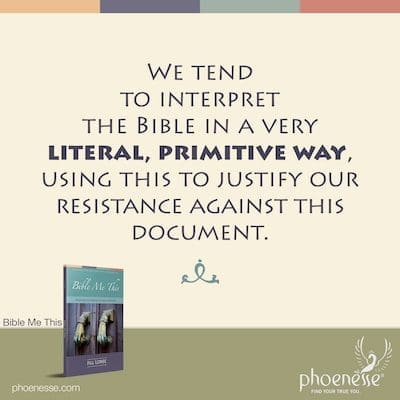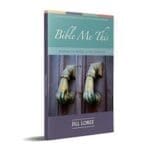
/
RSS Feed

In this collection of bible passages explained by the Pathwork Guide, we uncover hidden meanings and unravel many of the riddles of the Bible.
- The language the Bible uses seems to encourage moralizing, perfectionism, and other distortions. This is especially true with regards to sexuality and the non-acceptance of it. For example: “Do not fornicate,” in the Old Testament. Or how about the passage on adultery that Christ preached on the Mount? “But I say unto you. That whosoever looketh on a woman to lust after her hath committed adultery with her already in his heart”. Can you help us to understand this?
- Can you shed some light on the symbolism in this passage? “And if thy right eye offend thee, pluck it out, and cast it from thee. For it is profitable for thee that one of thy members should perish. And not that thy whole body should be cast into hell”. How can we read and interpret this in the spirit of love?
- In the Bible it says: “In the beginning there was the word and the word was God”. I have also heard the word is “Om.” Could you explain?
- What did Jesus mean in John 15:26 when he said this? “But when the Counselor comes, whom I shall send to you from the Father, even the Spirit of Truth, who proceeds from the Father, he will bear witness to me”. Also in John 16:13-15 he speaks of the Counselor or the Spirit of Truth who will “answer you into all the truth”. Who or what is the Counselor, or the Comforter, or the Holy Spirit?
- In Chapter 24, Verse 52 of the Gospel according to St. Matthew, Jesus says to one of his disciples who defended him against the servant of the high priest as they are capturing him: “Put up again thy sword into its place, for all that take the sword shall perish with the sword”. Is this to be our response in the struggle against evil?
- Can you explain what they are saying in the book of Revelation, the last book in the New Testament, John’s vision? The beast with ten horns and seven heads, ten crowns and a blasphemous name on each head; the mark of the beast, 666, which is man’s number; the 144,000 sealed on the forehead with God’s name who are untouched by the doom at the end of the world; the pregnant woman, the dragon and the woman’s fleeing to the desert for 1260 days; the thousand years of Satan’s imprisonment.
- In the first Beatitude, which Jesus Christ gives in his sermon on the mount, it says “Blessed are the poor in spirit, for theirs is the kingdom of heaven”. What is the meaning of this?
- In Matthew 5:32, it says, “But I say unto you, that whosoever shall put away his wife, saving for the cause of fornication causeth her to commit adultery; and whosoever shall marry her that is divorced committeth adultery”. Matthew 6:25 goes on to say, “Therefore I say unto you, take no thought for your life. Or what ye shall eat, or what ye shall drink, nor yet for your body, what ye shall put on. Is not the life more than meat, and the body more than raiment?” What’s up here?
Listen and hear the Pathwork Guide’s answers.
Bible Me This, Chapter 5c: Bible Passages Explained, Part Three


